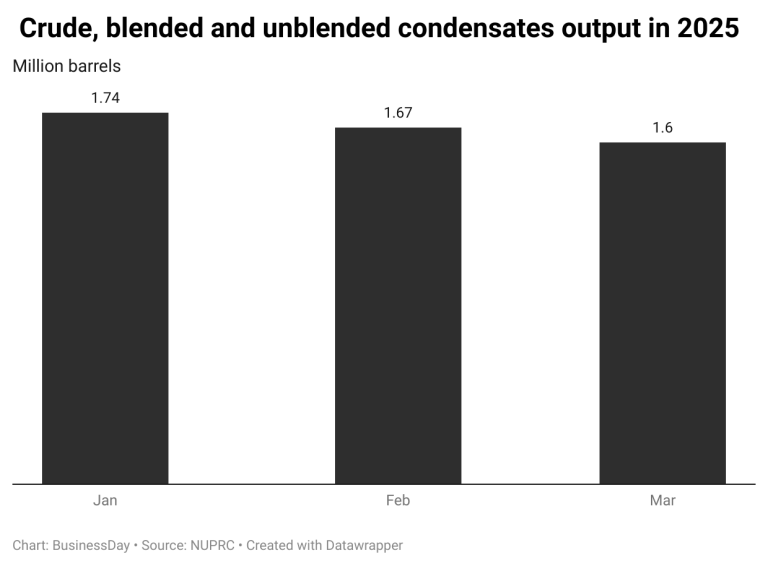Nigeria’s fiscal stability is under pressure as crude oil production plummeted to its lowest level yet in 2025, raising alarm bells about the country’s ability to fund its national budget. Data gleaned from the Nigerian Upstream Petroleum Regulatory Commission (NUPRC) revealed that Nigeria’s crude, blended and unblended condensates production declined by 68,177 barrels per day (bpd) in March.
Analysis of the report showed that Africa’s largest crude oil producer’s production declined to 1.60 million (bpd) from 1.67 million bpd in the period. Nigeria recorded 1.4 million bpd in crude production, and blended and unblended condensates stood at 55,827 barrels and 147,166 barrels, respectively.
Further analysis showed that the latest production is the lowest so far in the year, as Nigeria produced 1.74 million bpd in January and 1.67 million barrels in March. The report stated: “Lowest and Peak Combined crude oil and Condensate Production in March were 1.49 million bopd and 1.76 million bopd, respectively,”
“The daily average production in March was 1,603,776 barrels per day, comprising both Crude oil (1,400,783 bopd) and condensate (202,993 bopd).” The drop in production comes at a time when oil revenues remain a critical pillar of Nigeria’s economy, accounting for a substantial portion of the national budget.
With production falling well below OPEC quotas, the government faces mounting difficulties in meeting revenue targets and funding key developmental projects. The Nigerian government anchored its budget on a benchmark oil price of $75 per barrel and an ambitious production target of 2.06 million barrels per day.
Failing to meet production targets, global oil prices have also plunged in the last weeks on the back of the OPEC+ decision to accelerate production increases in May and US President Donald Trump’s tariffs of at least 10 percent and potential countermeasures.
Jide Pratt, COO of Aiona and country manager at TradeGrid, warned that this situation could result in increased borrowing, further swelling the nation’s debt profile. He said the current drop in oil prices exposes the country’s vulnerability to oil price shocks and underscores the urgency of economic diversification.
According to him, oversupply concerns, partly driven by the Organisation of Petroleum Exporting Countries’ decision to ramp up production, are also weighing on prices.
“Sadly for Nigeria, it means lower revenues, lower foreign reserves and with the cease of the Naira for crude then we could see increase in foreign exchange rates as we have which doesn’t help neither monetary nor Fiscal policy,” Pratt said.
He added that Nigeria may be forced to revisit its 2025 budget assumptions of $75, turn to supplementary budgets or loans, and prioritise structural reforms to cushion the impact.
“There’s a need to give more attention to sectors like agriculture, trade, and fintech, and consider asset sales to the private sector to drive growth,” Pratt said.

